Pastors’ creativity, desire to provide sacraments continue year into pandemic
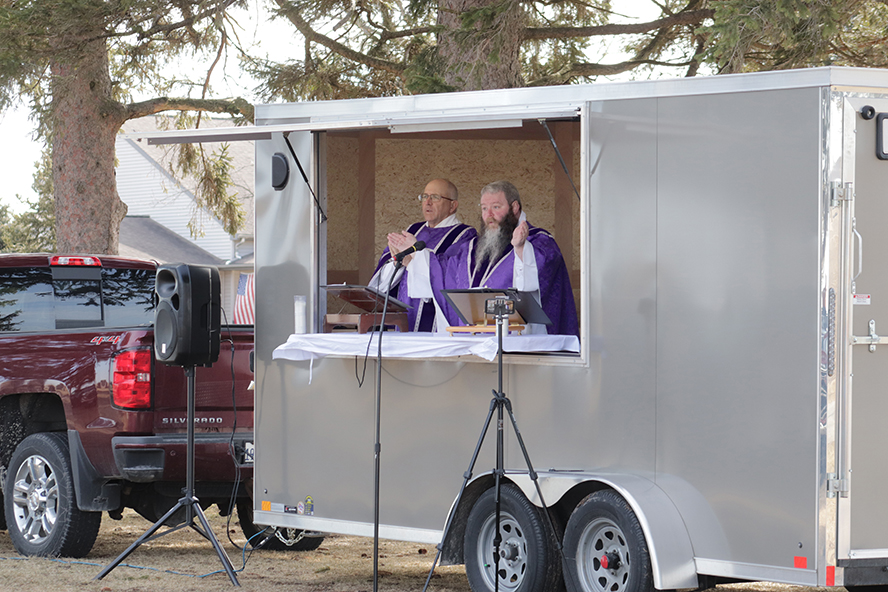
Assisted by Deacon Donald Koeberlein, Father Keith Walder celebrates Mass at Calvary Cemetery just east of Philo for members of St. Thomas Parish. He has been celebrating Mass there and at St. Mary Cemetery in Pesotum since permisson for outdoor Masses as given last June. (The Catholic Post/Jennifer Willems)
With towering pine trees for a steeple and bright sun providing warmth, members of St. Thomas Parish in Philo gathered in Calvary Cemetery east of town for Mass on March 7. The joy of being together was evident on the faces of those sitting in cars and lawn chairs and in their ability to receive the Eucharist.
Father Keith Walder has been ministering to his flock at Calvary Cemetery and at St. Mary Cemetery in Pesotum since last summer, when COVID-19 restrictions eased enough to allow for outdoor Masses in the Diocese of Peoria. The first Masses were celebrated on a flatbed truck, but now a refurbished food truck serves as the traveling chapel complete with its own tabernacle and crucifix.
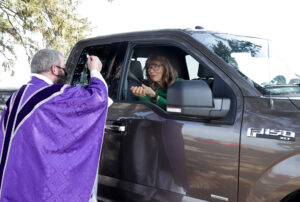
Father Keith Walder distributes Communion at the end of the Mass at Calvary Cemetery just east of Philo. The pastor of St. Thomas in Philo and St. Mary in Pesotum started celebrating Mass in the cemeteries for both parishes to enable more people to come than could be accommodated in each church. (The Catholic Post/Jennifer Willems)
“When the bishop allowed us to reconvene, we reconvened out here because with the restrictions our church is small, so we can’t accommodate everybody with the 25 percent capacity,” Father Walder said. “So we were trying to think outside the box.”
At 25 percent capacity, about 70 people may attend Mass inside the Philo church, while the Pesotum church can accommodate about 60. The cemeteries provide room for as many as 200 people to be at Mass, and since the ground is consecrated they’re still in a sacred space, he explained.
On Saturday afternoons Father Walder celebrates Mass at St. Thomas Church, and these are livestreamed.
“So many people commented that it’s so peaceful out here and they have that sense of peace and joy,” Father Walder said of the cemetery Masses. And some have told him they find comfort in being at Mass with their deceased loves ones.
They’ve continued to meet in the cemeteries for all but three recent Sundays, one of them when subzero temperatures would have made it difficult for Father Walder and Deacon Donald Koeberlein to distribute Communion as people drove out of the cemetery at the end of Mass. There was several inches of snow on the ground on the other Sundays and there’s no plowing in a cemetery.
REALLY CELEBRATING EASTER
Creativity and a deep desire to provide the sacraments for their parishioners has motivated pastors around the diocese to try new and different things since COVID-19 was declared a pandemic last March. Churches were closed and public celebrations of the Mass were suspended March 14, 2020, in the Diocese of Peoria. Bishop Daniel R. Jenky, CSC, extended that through Easter, April 12, and then indefinitely as Gov. JB Pritzker issued executive orders for people to shelter in place.
Masses resumed over the summer with restrictions on how many could be in the church and strict cleaning and social distancing protocols.
Students in Catholic schools were sent home on March 13 for two weeks, which turned into the rest of the spring semester as schools across the state switched to remote learning only.
When people could not come inside the church for Easter, Father Adam Cesarek, pastor of St. Mary in Pontiac, said it seemed like Lent never ended.
“They were with us virtually, but there was heaviness in the people’s hearts because they weren’t able to be in their churches for Easter,” he told The Catholic Post. “There is a feeling (now) that Lent is officially coming to an end.”
Father Cesarek said this Easter will mean so much more because of what people have experienced over the last year.
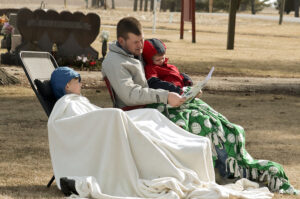
Wrapped snugly in blankets, 7-year-old Lucas and 4-year-old Logan prepare for Mass with their father, Matthew Herriott, in Calvary Cemetery of St. Thomas Parish, Philo, on March 7. It was the first anniversary of the death of daughter Ella Marie and Matthew said he appreciated being at Mass with lost loved ones. (The Catholic Post/Jennifer Willems)
“It’s as if there will be a greater sense of joy on account of Easter actually taking place in the community, in the parish, with each other again,” he said. “So I think that will bring a greater sense of joy into our time together as we get ready for the Easter Season.”
As with almost every parish in the diocese, St. Mary has been livestreaming Masses and that online presence is nice, but it’s not ideal, according to Father Cesarek.
“Jesus became incarnate. Our faith is incarnational. We’re meant to be with one another,” he said.
What continues to break his heart is those who are afraid to return to church because they are vulnerable to COVID-19. The parish has been offering drive-through Communion and Father Cesarek said he will be making a push for this at Easter to stave off “spiritual starvation.”
He is also concerned about those who are not receiving the sacraments and don’t have to stay away for health reasons.
“They don’t know what they’re missing,” he said. “I wish they did.”
STAYING CONNECTED
Father Thomas Szydlik, parochial vicar of the Hancock County Catholic community, said that as soon as the pandemic started, he and Father Tony Trosley, pastor, started looking for ways to keep people connected and give them hope.
In addition to the livestreamed Masses, they have been livestreaming the rosary and Chaplet of Divine Mercy each day. The rosaries draw between 15 and 20 in the moment and many more will watch the video later on, he said.
The Hancock County Catholic community, includes five parishes: Sts. Peter and Paul in Nauvoo, Sacred Heart in Dallas City, Immaculate Conception in Carthage, Sacred Heart in Warsaw, and St. Mary in Hamilton.
“Pretty early on we . . . would go and spend one day in each of our parishes,” Father Szydlik said. “One of us would stay at the church and hear confessions and the other would walk around the community — keeping a distance from people obviously, but making ourselves present in the local community and just being there with the folks.”
He said he appreciated finding new ways to be with the people and pray with them, calling it a “spiritual boost.”
With communication being key, they started producing a monthly newsletter that goes to every parishioner. There are columns by the priests, director of religious education, and outreach coordinator, as well as news from Sts. Peter and Paul School and a page on parish finances.
PEOPLE, CHURCH RESILIENT
“I’ve been impressed with how resilient our people have been and our church has been in the midst of some of the things we have never experienced before, like a total shutdown,” said Father Luke Spannagel, pastor of St. Mary and Sacred Heart parishes in Rock Island. “Being resilient in terms of keeping our faith, keeping our prayer going.”
He said it can be annoying to have so many restrictions and that people are getting weary of that, but he continues to see great efforts, even after a year.
“People are joyful to be at church and to be able to receive sacraments, even though we have constant reminders of the pandemic,” such as wearing masks and social distancing, Father Spannagel said.
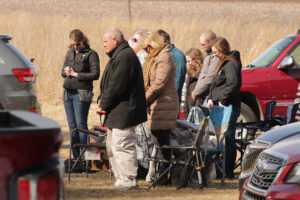
The weather was fine but cold on March 7, so members of the extended Cramer family scouted out a place in the sun for Mass at Calvary Cemetery of St. Thomas Parish in Philo. (The Catholic Post/Jennifer Willems)
He added that faith in the sacraments, which some had feared was waning, has been proven during the last year, and that has been personally enriching, too.
For example, the night before the churches were to close as a safeguard against spreading COVID-19, a young father called and asked if a few people could come for Mass and confession. Father Spannagel readily agreed and within 20 minutes about 100 people had come to church.
Another highlight was when Bishop Jenky granted permission for parishes to distribute Communion outdoors.
“That first Sunday we did it, for me it was one of the most joyful moments I’ve had as a priest in all my years,” he said, citing “the beautiful faith that people couldn’t hold back.”
Even though it was pouring down rain and he distributed Communion from his garage at St. Mary, “they were crying because they were so joyful. They were on their knees in this garage before our Lord. I was so struck by the beauty of that faith. People just kept coming.”
When Father Spannagel started celebrating outdoor Masses from the porch at Sacred Heart, people came from as far away as Chicago, Kansas City and all over Iowa. “They heard the sacraments were available so they came to receive them,” he said.
EVERYTHING OFFERED ONLINE
At St. Paul Parish in Danville, Father Bowan Schmitt, pastor, said they didn’t just livestream Masses, but made everything available to parishioners that way. “We just turned the camera on,” he said.
That included a daily eucharistic Holy Hour, rosary, Chaplet of Divine Mercy, and adult education classes. The parish website has been enhanced to include links to other resources and that has allowed them to evangelize as well as provide for parishioners spiritually, Father Schmitt said.
As someone who had the coronavirus earlier in the year, he knows what people are going through.
“We’ve had a number of families who have lost loved ones or those who got the virus and weren’t as lucky,” he told The Post. “Those funerals were difficult.”
Being locked out of the nursing homes and hospitals has been another hardship, said Father Schmitt, who is also vicar of the Danville Vicariate. “It’s starting to open up a little bit now, which is great. But that was challenging and hard.”
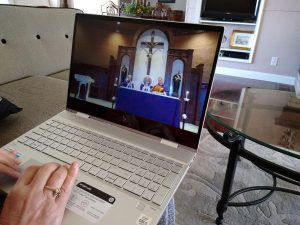 For those who are still nervous about coming into church, he has been offering Communion and the sacrament of reconciliation outside. “I didn’t want those kinds of sacraments to drop off,” he said.
For those who are still nervous about coming into church, he has been offering Communion and the sacrament of reconciliation outside. “I didn’t want those kinds of sacraments to drop off,” he said.
As the chaplain at Schlarman Academy, he has also been saying more Masses for smaller groups of students.
“I think that’s been a nice thing — more personal, more intimate,” Father Schmitt said. “I think perhaps that makes an even more profound effect on them when we gather for worship or for talks and things like that.”
He has continued to meet with those preparing for confirmation via Zoom and said the demeanor of all the Schlarman students changed as soon as sports resumed. That has included basketball and volleyball, and football practice is starting again.
Father Schmitt said he will know all is well when one thing happens.
“When we get back to coffee and doughnuts, I will know that we’re getting back to normal,” he said with a laugh.
WHAT COMES NEXT?
Father Joel Phelps said he is starting to work with his parishioners at St. Malachy in Rantoul and St. Elizabeth in Thomasboro on what comes next. Through Lent and Easter he is asking them to consider “Imagination in Action.”
“It’s been a little bit of a survival mode year,” he said. “It’s important, though, I think, to move from survival mode to a more strategic plan.”
That means looking at their mission, their vision for the future, and how they’re going to get there. For example, maybe it isn’t best to go back to everything they had been doing before the pandemic, according to Father Phelps, who is also vicar of the Champaign Vicariate.
“What we want to do is use the best of both worlds — the best of things that we were able to do and aren’t able to do right now, as well as the best of what we have learned to do that might be an improvement,” he said.
“What we want to do is use the best of both worlds — the best of things that we were able to do and aren’t able to do right now, as well as the best of what we have learned to do that might be an improvement.” — Father Joel Phelps
Over the last year, Father Phelps has taken a three-tiered approach to ministry: providing online access to weekly Mass and other studies; offering opportunities for confession and Communion outside; and giving parishioners indoor options for Mass and confession. One thing he never thought he’d do is hear confessions using a “car-fessional” — sitting in his car and having penitents pull up in their car.
“We’ve come up with something better now,” he said.
When the dispensation from the obligation to attend Mass is lifted, he doesn’t want the message to be, “You have to come back,” but “We’re able to celebrate the Eucharist more fully.”
The livestreaming his parishes and those around the diocese are doing is something good that has come out of the pandemic, Father Phelps said.
“Now we have a great tool for evangelization,” he explained, which will ultimately connect people to the life of a local church and parish.
That will be key as parishes prepare to welcome people back after the pandemic, said Father Gary Blake, pastor of St. Valentine, St. Mary and St. Joseph in Peru and vicar of the LaSalle Vicariate.
“We’re all called to bring the message of the Gospel to others in any way we can,” he said. “We have to get that message out there.”





